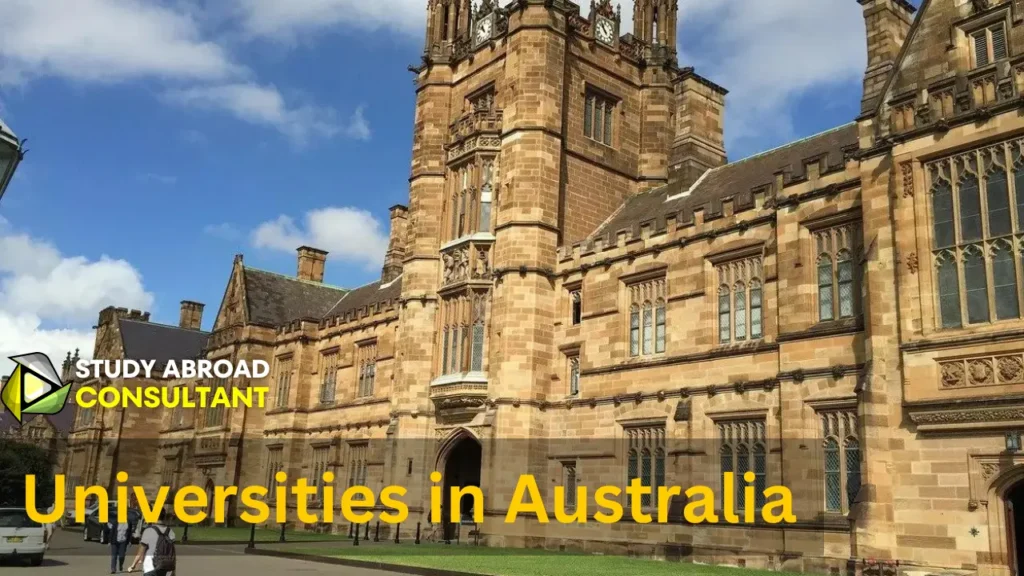Australia is well known for its vibrant lifestyle, varied culture, and excellent educational system. Study in Australia offers students from all over the world the chance to experience a rich and varied cultural environment while receiving an education of the highest caliber. We will cover every facet of study in Australia in this extensive guide, including the best universities, the application procedure, visa requirements, and living as an international student.
Why Study in Australia?
Some of the top institutions in the world, renowned for their superior teaching and research, are located in Australia. To accommodate diverse academic interests and employment objectives, the nation provides a wide choice of programs and degrees.
High-Quality Education
Global education rankings typically place Australian universities in the top ranks. Universities with strong academic reputations and cutting-edge research initiatives include the University of Sydney, the Australian National University, and the University of Melbourne. These academic institutions provide a variety of undergraduate, graduate, and doctorate programs that provide students the information and abilities they need to be successful in their chosen industries while study in Australia.
Diverse and Inclusive Environment
Australia is a cosmopolitan country that welcomes international students. Because of this diversity, students are able to engage in a broad cultural experience, gain insight from a variety of viewpoints, and expand their social and professional networks worldwide.
Research Opportunities
Australian universities are at the forefront of global research, offering students numerous opportunities to engage in cutting-edge research projects. Whether in science, engineering, medicine, or humanities, students have access to state-of-the-art facilities and leading academics in their fields.
Strong Support Systems
For overseas students, Australia provides a comprehensive support network that includes academic help, career counseling, and personal support services. To assist students in acclimating to their new surroundings while study in Australia, universities offer orientation programs, mentorship opportunities, and specialized offices for foreign students.

Top Universities in Australia
Australia boasts several prestigious universities, each with its unique strengths and offerings. Here are some of the top institutions for international students:
University of Melbourne
The University of Melbourne is one of Australia’s oldest and most respected institutions. It is known for its strong emphasis on research and interdisciplinary studies, offering a wide range of programs across various disciplines.
Australian National University (ANU)
Located in Canberra, ANU is renowned for its research excellence and high academic standards. It offers programs in arts and social sciences, business, law, and engineering, among others.
University of Sydney
The University of Sydney is famous for its stunning campus and diverse range of programs. It has a strong reputation in fields such as law, business, engineering, and medicine.
University of Queensland (UQ)
UQ is known for its research-intensive programs and vibrant campus life. It offers a wide array of undergraduate and postgraduate courses in science, technology, engineering, and humanities.
Monash University
Monash University is a member of the prestigious Group of Eight, a coalition of leading Australian universities. It is recognized for its research contributions and offers programs in areas such as medicine, engineering, business, and arts.

Application Process for International Students
Applying to study in Australia involves several steps, from choosing the right course and university to securing a student visa. Here’s a step-by-step guide to help you navigate the process:
1. Choose Your Course and University
Start by researching the courses and universities that best align with your academic interests and career goals. Consider factors such as university rankings, program content, faculty expertise, and campus facilities.
2. Check Entry Requirements
Each university and program will have specific entry requirements, including academic qualifications, English language proficiency, and relevant work experience. Ensure that you meet these requirements before applying.
3. Prepare Your Documents
Gather all necessary documents, including academic transcripts, certificates, English language test scores (such as IELTS or TOEFL), a personal statement, and letters of recommendation. Some programs may also require a portfolio or work samples.
4. Submit Your Application
To study in Australia apply directly to your chosen universities through their official websites or through centralized application portals such as StudyLink or the Universities Admissions Centre (UAC). Pay attention to application deadlines and ensure that all required documents are submitted on time.
5. Receive Your Offer Letter
Once your application is reviewed, you may receive an offer letter from the university. This letter will outline the terms of your admission, including the course details, tuition fees, and any conditions you must meet.
6. Apply for a Student Visa
You can apply for an Australian student visa (subclass 500) after you have your offer letter in hand. A valid passport, evidence of sufficient cash, health insurance, and your Confirmation of Enrollment (CoE) are among the documents needed for the visa application procedure.
Also Read : Study In China
Visa Requirements for International Students
To study in Australia, you will need to obtain a student visa (subclass 500). Here are the key requirements and steps to secure your visa:
1. Confirmation of Enrolment (CoE)
You must have a CoE from an Australian university to study in Australia, confirming your enrollment in a full-time course.
2. Genuine Temporary Entrant (GTE) Requirement
You need to demonstrate that you are a genuine temporary entrant, intending to stay in Australia temporarily for the purpose of study. This involves providing evidence of your ties to your home country and your intentions to return after completing your studies.
3. Financial Requirements
You must show proof of sufficient funds to cover your tuition fees, living expenses, and travel costs. This may include bank statements, scholarship letters, or financial guarantees.
4. English Proficiency
You must meet the English language requirements for your course, typically demonstrated through IELTS, TOEFL, or PTE scores.
5. Health and Character Requirements
You may need to undergo a medical examination and provide a police clearance certificate to meet Australia’s health and character requirements.
6. Overseas Student Health Cover (OSHC)
You must have OSHC for the duration of your stay in Australia. This health insurance covers medical and hospital expenses while you are studying in Australia.

Life as an International Student in Australia
Study in Australia is not just about academics; it’s also about embracing a new lifestyle and culture. Here are some aspects of life as an international student in Australia:
Accommodation
Australia offers various accommodation options, including on-campus residences, off-campus apartments, homestays, and shared houses. Each option has its benefits, and your choice will depend on your budget, preferences, and the location of your university.
Cost of Living
The cost of living in Australia varies depending on the city and your lifestyle. Major cities like Sydney and Melbourne tend to be more expensive, while cities like Adelaide and Brisbane offer more affordable living options. On average, international students need around AUD 20,000 to 27,000 per year to cover living expenses.
Work Opportunities
International students in Australia can work part-time (up to 20 hours per week) during their studies and full-time during scheduled breaks. This allows students to gain valuable work experience and supplement their income. Popular student jobs include retail, hospitality, and administrative roles.
Social and Cultural Life
Australia is known for its vibrant social and cultural life. Students can participate in various extracurricular activities, join clubs and societies, and explore the country’s natural beauty. From beaches and national parks to cultural festivals and sporting events, there is always something to do in Australia.
Health and Safety
Australia is considered a safe and welcoming country for international students. Universities provide support services to ensure students’ well-being, including health services, counseling, and security on campus. It is important for students to familiarize themselves with local laws and safety guidelines.
Conclusion
Study in Australia offers a wealth of opportunities for academic growth, personal development, and cultural enrichment. With its world-class education system, diverse and inclusive environment, and strong support networks, Australia is an ideal destination for international students. By following the application process and meeting the visa requirements, you can embark on an exciting journey that will shape your future in profound ways.
Frequently Asked Questions (FAQs) about Study in Australia
1. What are the benefits of study in Australia?
Australia offers high-quality education, diverse cultural experiences, research opportunities, and strong support systems for international students. Students benefit from studying at globally ranked universities, gaining valuable work experience, and living in a safe and welcoming environment.
2. How do I choose the right university and course in Australia?
Research various universities and courses based on factors such as academic reputation, program content, faculty expertise, campus facilities, and location. Consider your academic interests, career goals, and personal preferences when making your decision.
3. What are the entry requirements for Australian universities?
Entry requirements vary by university and course but typically include academic qualifications, English language proficiency (IELTS, TOEFL, PTE scores), and relevant work experience. Some programs may require a portfolio, personal statement, or letters of recommendation.
4. How do I apply to study in Australia?
You can apply directly to your chosen universities through their official websites or centralized application portals like StudyLink or the Universities Admissions Centre (UAC). Ensure you meet all entry requirements and submit the necessary documents before the application deadlines.
5. What is the cost of study in Australia?
Tuition fees for international students vary by course and university. On average, undergraduate programs cost between AUD 20,000 to 45,000 per year, while postgraduate programs range from AUD 22,000 to 50,000 per year. Additionally, living expenses average around AUD 20,000 to 27,000 per year.
6. Can I work while study in Australia?
Yes, international students can work part-time (up to 20 hours per week) during their studies and full-time during scheduled breaks. This helps students gain work experience and support their living expenses.
7. What are the visa requirements for study in Australia?
To study in Australia, you need a student visa (subclass 500). Requirements include a Confirmation of Enrolment (CoE) from an Australian university, proof of sufficient funds, English proficiency, health and character checks, and Overseas Student Health Cover (OSHC).
8. How do I apply for an Australian student visa?
You can apply for a student visa online through the Department of Home Affairs website. You’ll need to provide your CoE, financial documents, English test scores, health insurance details, and other required documents. Ensure you meet all criteria and submit your application before the course start date.
9. What accommodation options are available for international students?
Accommodation options include on-campus residences, off-campus apartments, homestays, and shared houses. Each option varies in cost and facilities, so choose based on your budget, preferences, and university location.
10. What support services are available for international students in Australia?
Australian universities offer extensive support services, including academic assistance, career counseling, health services, and personal support. Orientation programs, mentorship, and dedicated international student offices help students adjust to their new environment.



